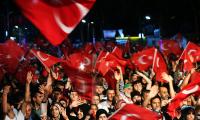Türkiye heads into a second round of presidential election
On May 14, the Turkish people voted in both parliamentary and presidential elections to decide who the leader of the country will be for the next five years. A historically close election means that the two main candidates move on to a second round on May 28.

The incumbent president, Recep Tayyip Erdogan, has been in power for more than 20 years. First as prime minister and, from 2014, as the president of the second-most populous NATO country. Erdogan increased his power after a failed coup in 2016 and imposed strong control of, among others, the media and civil society organisations in the country.
Hit by inflation and earthquakes
The re-election bid is marked by several significant challenges. Türkiye faces soaring inflation and is reeling from twin earthquakes that have left more than 50,000 people dead and even more homeless.
Increasing numbers of Turks have blamed Erdogan for the inflation due to his refusal to raise interest rates. The official inflation rate is just above 50%, but experts estimate that it is higher than 100%.
Furthermore, Erdogan has been heavily criticised for the government's earthquake response, which was seen as slow, inflexible, and incompetent and linked to his weakening of important institutions and the appointment of political allies to key positions.
Six parties, one candidate
For the first time in many years, Erdogan and his allies are genuinely worried about the outcome of the presidential election. This election is unique as Kemal Kilicdaroglu, the leader of the main opposition party, the Republican People's Party, has assembled an unprecedented broad coalition of six parties behind his candidature.
The parties ranged from his own centre-left party and the nationalist Good Party to four smaller parties, which include two former Erdogan allies. He also has the support of the popular mayors of Ankara and Istanbul.
The coalition is running primarily on an anti-Erdogan platform and promises a string of democratic reforms designed to curtail the president’s power and strengthen smaller political parties and civil society.
A top ten autocratizer
Türkiye has been heavily autocratized in recent years. The V-Dem Institute classifies Türkiye as an ‘electoral autocracy’, having transitioned from an ‘electoral democracy’ ten years ago, and places it among the top ten autocratizing countries in the last ten years.
This is primarily due to how Erdogan's governments have sought to repress free speech and political competition, as exemplified by a new law in 2022 criminalising the dissemination of “false information”.
The election itself was also heavily criticised by international observers for being an ’unlevel playing field’, as the continued restrictions on freedoms of assembly, association, and expression hindered the participation of some opposition politicians and parties, as well as independent media and civil society organisations.
Election results
Despite these democratic challenges, voter turnout was remarkably high, with 87% of eligible Turkish voters, both in the country and from its large diaspora population, participating in the first round of elections. Erdogan received 49.5% and Kemal Kılıçdaroğlu received 44.9% of the votes. Lastly, 5% of the votes went to the ultranationalist candidate Sinan Oğan.
Since none of the candidates received more than 50% of the votes, a second round of elections will be held between Erdogan and Kılıçdaroğlu. Since Sinan Oğan was a strong nationalist candidate, most of his supporters are expected to vote for Erdogan.
In the second round, it will be decided who will lead the 85 million-strong country in the future. The outcome of the election will have great significance for the country's further democratic development.